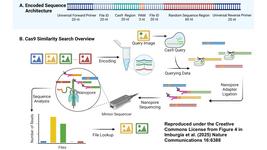CMN Weekly (25 August 2023) - Your Weekly CRISPR Medicine News
Top picks
‘Living life to the fullest:’ Sickle cell gene-editing study at Cleveland Clinic, UH offers hope of pain-free living. This writeup tells the story of Danielle Lee, a participant of the Editas-sponsored RUBY clinical trial of EDIT-301 for severe sickle cell disease. Read more about the RUBY trial in a recent clinical trial update here.
Research
- In an article published in Analytical Chemistry yesterday, a team of scientists in China report a miRNA detection method termed miRoll-Cas, where miRNA is first amplified by rolling circle transcription and then subjected to CRISPR-Cas13a assay. Using miRoll-Cas, the team observed sensitive detection of multiple cancer-relevant miRNA markers (miR21, miR141, and Let7b) and specifically identified other variants of the Let7 family, which can accurately discriminate prostate cancer patients from healthy people. The team propose that the miRoll-Cas assay may be readily translated to clinical applications in the diagnosis of a variety of diseases beyond cancer.
- Scientists from Massachusetts Institute of Technology and the recently-launched Amber Bio shared details of their new Splice Editing platform on the pre-print server BioXriv earlier this week. By combining CRISPR-mediated RNA targeting with endogenous cellular RNA-splicing machinery, Splice Editing can be used to correct gene transcripts in situ by programmable insertion or replacement of large RNA segments. The technology allows efficient and precise large-scale gene editing without DNA cleavage or mutagenesis. It works in human cells, and has been demonstrated to affect different types of edits across multiple targets and cell lines. Amber Bio is currently advancing multiple programmes to develop new therapies for genetic diseases with high allelic diversity.
- Last week, Jennifer Doudna's lab at UC Berkeley announced the soft launch of CasPEDIA (http://caspedia.org), which is the Cas Protein Effector Database of Information and Assessment, an encyclopedia of Class 2 CRISPR systems, presented in wiki format.
- In an article published in Nano Letters last week, scientists in China report a new approach to combination cancer therapy based on nanoparticles (NPs)-embedded with dissolving microneedles (IR780-PL/pFBXO44@MNs) with steerable and flectional properties. The team used the NPs to achieve co-delivery of FBXO44-targeted CRISPR-Cas9 plasmids (pFBXO44) and hydrophobic photosensitisers. High FBXO44 expression has been demonstrated to correlate with poor cancer outcomes. The novel approach led to eradication of tumour cells and suppression of lung metastasis in animal models.
Industry
- Epic Bio has presented new data on its epigenetic editing platform at the CRISPR Frontiers conference, held last week in Cold Spring Harbor, New York. The company is developing novel therapies to modulate gene expression using compact, non-cutting catalytically-dead (d)Cas proteins. Among the highlights of the details presented in six poster presentations at the conference, the company made the first disclosures of the results of their in-house protein engineering efforts to improve upon CasMINI, the smallest Cas protein known to work in human cells. The company generated novel Cas effectors even smaller than CasMINI, under 500 amino acids in size, and with improved epigenetic editing activity. These hypercompact CRISPR components can enable packaging within a single adeno-associated virus and delivery of multiple modulators simultaneously.
- Indian biotech startup CrisprBits has formed a strategic collaboration with MolBio Diagnostics to launch point-of-care (POC) CRISPR-based tests. The collaboration is intended to leverage CrisprBits’ expertise in biotechnology and MolBio’s translation, manufacturing, and distribution abilities to build POC tests that can detect pathogens and genetic markers. The tests will be made available in clinics, hospitals, and resource-limited areas.
Reviews
- Emerging and potential use of CRISPR in human liver disease. This review looks at the various ways in which CRISPR has been explored for the treatment of liver disease in humans, including disrpution, e.g., of a maladaptive protein, and gene correction to restore normal gene function. The authors also touch upon CRISPR-based strategies to tackle hepatitis B infection.
- To Cut or not to Cut: Next-generation Genome Editors for Precision Genome Engineering. In this review, authors based at University of Illinois, U.S., focus on recent advances that help address the challenges associated with translation of CRISPR-based gene-editing technologies into safe and effective therapeutics, including the engineering and discovery of novel CRISPR-Cas systems with improved functionalities and the development of double-stranded break (DSB)-free genome editors.
- Gene therapy for Duchenne muscular dystrophy: an update on the latest clinical developments. In this review, the authors describe the status of clinical-stage gene therapy approaches to treat duchenne muscular dystrophy. Therapeutic approaches covered include gene replacement, gene substitution, RNA-based therapeutics, readthrough mutation, as well as strategies based on CRISPR.
- Antiretrovirals to CCR5 CRISPR/Cas9 gene editing - A paradigm shift chasing an HIV cure. The authors of this review discuss anti-retroviral therapeutic challenges, clinical successes, and failures of allogeneic and allogeneic haematopoietic stem cell transplants harbouring a homozygous 32-bp gene deletion in the CCR5 receptor, as well as newer exciting developments within CCR5 editing using CRISPR-Cas9 in the search to cure HIV.
Interviews
In a recent interview for The American Journal of Managed Care, Kevin Davies, PhD, executive editor, The CRISPR Journal and GEN Biotechnology, and author of Editing Humanity: The CRISPR Revolution and the New Era of Genome Editing, briefly discusses the difficulties inherent in making CRISPR gene editing technology an equitable treatment. Watch, listen and read a transcript here.
Huh, heh, wow
Gene-edited mustard: Less pungent, more useful. Indian scientists have developed the first ever low-pungent mustard that is pest and disease-resistant. It is based on CRISPR-Cas9 gene editing, while being non-genetically-modified and transgene-free. This recent piece from The Indian Express looks at whether or not gene-edited mustard is significant for consumers and oilseed producers.
News from CRISPR Medicine News
- In this week's clinical trial update, we bring a roundup of the ongoing trials of gene-edited therapies for cancers of the gastrointestinal tract. Read the update here.
- Looking for a job in gene editing? Then look no further than the leading CRISPR jobs platform at CRISPR Medicine News. View all current openings here.
To get more of the CRISPR Medicine News delivered to your inbox, sign up to the free weekly CMN Newsletter here.
Tags
CLINICAL TRIALS
Sponsors:
Suzhou Maximum Bio-tech Co., Ltd.
Sponsors:
Zhejiang University







